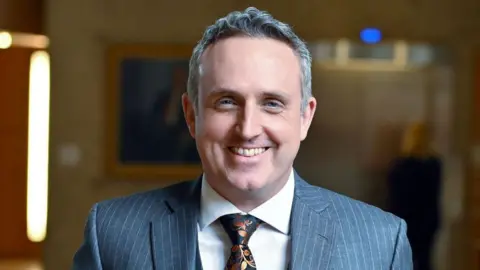Who is Alex Cole-Hamilton?
 Getty Images
Getty ImagesAlex Cole-Hamilton: The basics
Age: 46
Education: Madras College, then politics and international relations at Aberdeen University
Family: He and his wife Gillian, who has also stood for the Lib Dems, have three children
Parliamentary constituency: MSP for Edinburgh Western in the Scottish Parliament
Who is he?
Alex Cole-Hamilton moved to Scotland from Hertfordshire, England, as a child.
He attended Madras College in St Andrews then went on to study politics and international relations at Aberdeen University.
Before becoming a politician, he worked for children's charities including YouthLink Scotland and Aberlour.
The father-of-three has said it was his experience of working with vulnerable children, and what he saw as politicians' failure to help them, that inspired him to get into politics.
What was his route to power?
Born into a Liberal Democrat family, Mr Cole-Hamilton had an early introduction to campaigning, and has recalled how he helped to deliver leaflets during the 1987 general election campaign at the age of nine.
Mr Cole-Hamilton made several unsuccessful attempts to be elected to Holyrood before he finally won the Edinburgh Western seat in 2016.
In 2021, he took over from Willie Rennie as leader of the Scottish Liberal Democrats.
Earlier this year Mr Cole-Hamilton told BBC Scotland News he had been receiving therapy due to the amount of online abuse he has suffered in his role as party leader.

What are his key pledges?
Alex Cole-Hamilton says that his candidates, if elected, will be "strong local champions".
The Scottish Lib Dems also want to:
- Transform mental health services by taxing social media giants
- Insulate homes to cut energy bills
- Fix Scotland's "broken" relationship with Europe
- Create a green jobs revolution
What state are the Scottish Liberal Democrats in?
The Lib Dems are hoping to bounce back from the electoral kicking they took in the aftermath of their term in coalition with the Conservatives at Westminster.
Once a party of government at Holyrood, they currently do not even qualify for a weekly question to the first minister because they only have four MSPs.
At Westminster, the party has strong pockets of support – but they are very localised, meaning they may struggle for targets to return many more MPs.
Boundary changes have muddied the picture somewhat, but the party won four seats in 2019 and were second in two others – and otherwise, are in third or fourth place everywhere else.
Their hope at this election may be to win in the four or five seats they are competitive in, and to build enough support in other places to carve out a foothold for a wider recovery in future elections.
Read the profiles of other Scottish party leaders here:
